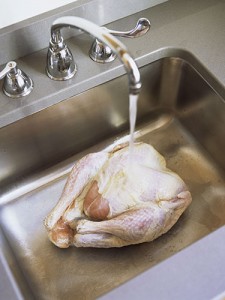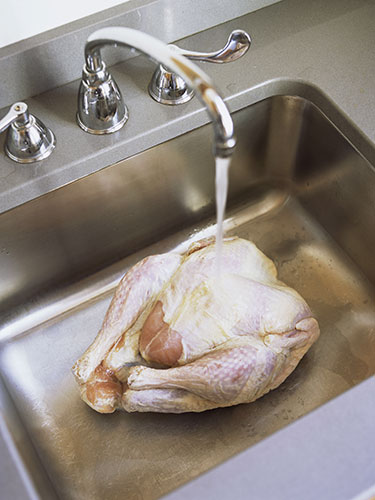Members of the public are being encouraged by Derry City Council not to wash raw chicken to reduce the risk of contracting campylobacter, which can lead to a potentially dangerous form of food poisoning.
The Council is working with the Food Standards Agency in Northern Ireland (FSA) to highlight the dangers of the bug after a survey showed more than 80% of people here don’t know the name of the bug that is the most common cause of food poisoning.
The research, launched today to mark the start of Food Safety Week, (June 16-22) shows that while 90% of people in Northern Ireland are familiar with the names of other bacteria like salmonella and E.coli, only 19% had ever heard of campylobacter (cam-pie-lo-bac-tor), which is commonly found in raw chicken.
Dr Kirsten Dunbar, from the Food Standards Agency, said although people often washed their hands after touching raw chicken and made sure it was thoroughly cooked, the research found over a third of people here always washed chicken before cooking it and this could spread campylobacter bacteria onto hands, work surfaces, clothing and cooking equipment through splashing water.
He added: “Campylobacter is a serious issue. You can’t see it, smell it or even taste it on food, but if it affects you, you really won’t forget it!
“The resulting illness can cause abdominal pain, as well as severe diarrhoea and vomiting.
“In certain cases, it can lead to irritable bowel syndrome, reactive arthritis and Guillain-Barré syndrome, a serious condition of the nervous system. At its worst, it can kill.”
Genevieve McWilliams, Environmental Health representative for Derry City Council said there was no need to wash raw chicken as thorough cooking kills any bacteria.
She added: “Our advice is to wash the utensils, chopping boards and surfaces used to prepare raw chicken as well as washing your hands. Make sure chicken is steaming hot all the way through before you eat it – with no pink meat – and check that the juices run clear.”
For more information on the FSA’s campylobacter campaign, and for guidance on the safest way to handle chicken, visit food.gov.uk/chicken or safefood.eu
Tags:






